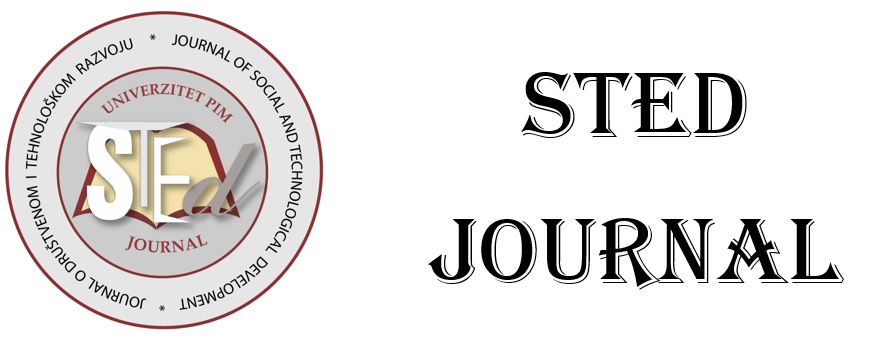Current issue

Volume 7, Issue 2, 2025
Online ISSN: 2637-2614
ISSN: 2637-2150
Volume 7 , Issue 2, (2025)
Published: 28.11.2025.
Open Access
All issues
Contents
29.05.2023.
Original scientific paper
THE CONNECTION BETWEEN THE PERCEPTION OF MOBBING AND WELL-BEING AT WORK FEMALE EMPLOYEES
Mobbing is a behaviour whose aim is to underestimate and degrade other human beings by means of malevolent language and obscure cruel acts, which gradually undermine one’s proper functioning and affect both one’s mental and physical health (Kostelić-Martić, 2005). Well-being at work refers to all aspects of employees’ workplace life, from how they feel, what their working environment is like, safety at work including physical and psychological safety, job satisfaction, involvement in work and the position they have in the organization. The research problem refers to the examination of the connection between the perception of mobbing and the well-being at work of employees. Individuals who perceive mobbing as present in the organization and who are exposed to this type of stress, have impaired well-being. According to earlier findings, mobbing significantly affects the well-being of individuals at work in a way that impairs it, whereby they experience various psychological disturbances and are thrown out of work activities, because they stop adequately performing work tasks. Also, people who experience mobbing have a decline on motivation, work efficiency, a drop in the feeling of fulfillment, loss of trust, they complain of fatigue and feelings of anger and frustration. Two measurement instruments were used in the research: the mobbing perception scale and the Work Well-being Scale – WBWS, which have satisfactory measurement characteristics. The survey was conducted via an anonymous internet questionnaire, and a representative sample of employees in Bosnia and Herzegovina was used (n=273). The data thus obtained indicates that, statistically, the perception of mobbing is significantly negatively related to well-being (rho=-.382, p<.01), and its two aspects: positive affects (rho=-.531, p<.01), a feeling of fulfillment (rho=-.337, p<.01), and positively related to the negative effects aspect (rho=.592, p<.01), which confirms both the starting hypothesis and its sub-hypotheses. The perception of mobbing in the workplace negatively affects the well-being at work, i.e. higher levels of subjective perception of mobbing go hand in hand with lower levels of well-being at work. Furthermore, higher levels of the perception of mobbing are accompanied with lower levels of positive affects and feeling of fulfillment, and higher levels of negative affects.
Although the consequences of mobbing are felt, to the greatest extent, on an individual level, there are inevitable negative consequences on the organizational level as well. As mobbing has a negative effect on the well-being at work of an individual, it also adversely affects the work and results of the entire organization.
Snježana Stanar
29.11.2023.
Original scientific paper
ANALYSIS OF RELATIONSHIPS BETWEEN TEACHERS' ATTITUDES ON CHANGES IN EDUCATION, IDENTIFICATION WITH SCHOOL AND JOB SATISFACTION IN SCHOOL
The extent to which changes in the education system are driven by external economic and social systems and internal
factors of the education system is an open question that has yet to be answered after detailed analysis and research. Job satisfaction at school can influence the formation of positive attitudes, and cannot be excluded from the examination of individual attitudes about changes in the organization. Identification with the school represents a particularly significant form of positive attitudes of employees at the school, it has positive personal consequences in terms of better professional advancement, and therefore better performance of work. The research sample has elements of a multi-stage opportunity with elements of random selection, because a survey was conducted of teachers in the schools on Republika of Srpska, who were present at the sessions of the teaching-departmental council (n=400) at the time of the survey. The obtained data (analysis of responses on the scale of general and specific attitudes about changes and factor analysis) show that although teachers manifest a positive general attitude about changes in education, it should be noted that certain aspects of changes are latently perceived as negative. The general attitude about changes in education is statistically significantly positively related to identification with the school (r=.477, p<.001) and with job satisfaction at the school (r=.225, p<.001). Also, the results showed statistically significant differences in some special attitudes about changes in education with regard to the degree of identification with the school (perception of the outcome of changes in education χ²=16.869, df=2, p=.000 and readiness for additional education, χ²= 6.146, df=2, p=.046), while there are no such differences when it comes to being informed about changes and willingness to engage in changes. Furthermore, the results showed statistically significant differences in some special attitudes about changes in education with regard to job satisfaction at school (perception of the outcome of changes, χ²=32.081, df = 2, r=.000, awareness of changes χ²=14.259, df =2, r=.001 and readiness for additional education in order to improve one's own competencies χ²=8.621, df=2, p=.013). Desirable changes in this area Stanar, S. (2023). Analiza relacija između stavova nastavnika o promjenama u obrazovanju,
identifikacije sa školom i zadovoljstva poslom u školi. STED Journal, 5(2), 1-19. STED Journal 5(2). November 2023. Journal homepage: https://stedj-univerzitetpim.com/en/homepage/ 19 need to be focused both on changes in the
individual and on changes in society as a whole. From the aspect of changes in the individual itself, it is not so much a problem to establish what it is that moves some individuals and hinders others in the process of change, as much as it is a problem find a way to use the obtained data in a practical sense: what, how and why to change.
Snježana Stanar










